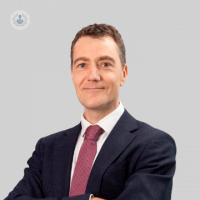I’ve torn my ACL – do I have to have surgery?
Written in association with:The anterior cruciate ligament (ACL) is a major ligament in the knee, which if torn due to injury or accident requires medical attention. Depending on how active you are, the extent of the injury and your lifestyle there are different treatment options available. Mr James Donaldson, an expert orthopaedic surgeon, discusses when surgery to repair an ACL injury is recommended and when it may not be necessary.

How do you know if you have injured your ACL?
An injury to the ACL is often from trauma and results in pain, swelling and stiffness within a few hours. Some patients report hearing a ‘pop’ sound. The knee may also feel unstable in the weeks afterwards.
How is an ACL tear treated?
An ACL tear is often treated with surgical reconstruction. The gold standard is harvesting your own hamstring tendons and fashioning a new ligament out of them. The new ligament is then inserted into the knee arthroscopically. Performing a reconstruction arthroscopically is minimally invasive, making use of an arthroscope (a slender, ocular device with a camera) which is inserted into a small incision. This means that the joint does not have to be opened up fully. Using the arthroscope, the surgeon is able to view the joint on a video monitor. This method has faster recovery times, and a reduced chance of complications arising.
Is surgery always required for an ACL injury?
Surgery is not always necessary. Some patients, particularly with less sporting ambitions, may recover sufficiently with physiotherapy alone. Whilst surgery is usually the best option for young, active and athletic people, not all people with ACL injuries need or want to go through surgery. Luckily, with a committed physiotherapy routine, the ACL can begin to heal naturally.
How long is the recovery from ACL reconstruction?
Patients can walk and gently exercise the knee straight away, but it takes some weeks for the swelling and pain to settle fully. It may take 6 to 9 months before returning to full sporting activity as the new ligament needs to heal and the knee must be rehabilitated.
If you have injured your ACL and need like to see a specialist or would like to learn more, make an appointment now.


